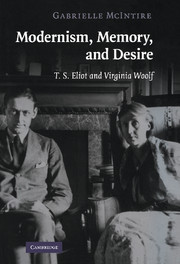Book contents
- Frontmatter
- Contents
- Illustration
- Acknowledgments
- Introduction
- 1 An unexpected beginning: sex, race, and history in T. S. Eliot's Columbo and Bolo poems
- 2 Mixing memory and desire: rereading Eliot and the body of history
- 3 Eliot, eros, and desire: “Oh, do not ask, ‘What is it?’”
- 4 T. S. Eliot: writing time and blasting memory
- 5 Virginia Woolf, (auto)biography, and the eros of memory: reading Orlando
- 6 Other kinds of autobiographies: sketching the past, forgetting Freud, and reaching the lighthouse
- 7 Remembering what has “almost already been forgotten”: where memory touches history
- Epilogue
- Notes
- Index
4 - T. S. Eliot: writing time and blasting memory
Published online by Cambridge University Press: 22 September 2009
- Frontmatter
- Contents
- Illustration
- Acknowledgments
- Introduction
- 1 An unexpected beginning: sex, race, and history in T. S. Eliot's Columbo and Bolo poems
- 2 Mixing memory and desire: rereading Eliot and the body of history
- 3 Eliot, eros, and desire: “Oh, do not ask, ‘What is it?’”
- 4 T. S. Eliot: writing time and blasting memory
- 5 Virginia Woolf, (auto)biography, and the eros of memory: reading Orlando
- 6 Other kinds of autobiographies: sketching the past, forgetting Freud, and reaching the lighthouse
- 7 Remembering what has “almost already been forgotten”: where memory touches history
- Epilogue
- Notes
- Index
Summary
I sometimes wonder if that is what Krishna meant –
Among other things – or one way of putting the same thing:
That the future is a faded song, a Royal Rose or a lavender spray
Of wistful regret for those who are not yet here to regret,
Pressed between yellow leaves of a book that has never been opened.
T. S. Eliot, “The Dry Salvages”If Time and Space, as Sages say,
Are things which cannot be,
The sun which does not feel decay
No greater is than we.
So why, Love, should we ever pray
To live a century?
The butterfly that lives a day
Has lived eternity.
T. S. Eliot, “If Time and Space as Sages Say”But while we looked into the future, we were completely under the power of the past.
Virginia Woolf, “A Sketch of the Past”It is one of the paradoxes of modernist writing that in its self-conscious efforts at making it “new,” writers from across its experiment repeatedly turned to the past. Of course, what is absolutely new is always already historical, and Ezra Pound's rallying cry, “make it new,” invokes a repeated adage about the phantasy of leaving behind old orders – outworn words, aesthetics, structures, styles, politics, and psychic dispositions. Jacques Lacan suggests that “Repetition … demands the new,” and we might think of the modernist fixation on newness as registering an anxious obsession with the dilemma of their own repetition and belatedness.
- Type
- Chapter
- Information
- Modernism, Memory, and DesireT. S. Eliot and Virginia Woolf, pp. 101 - 118Publisher: Cambridge University PressPrint publication year: 2008



